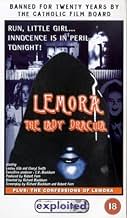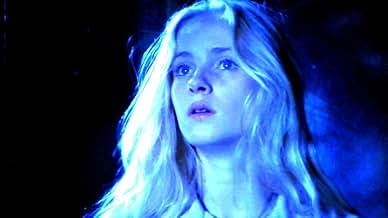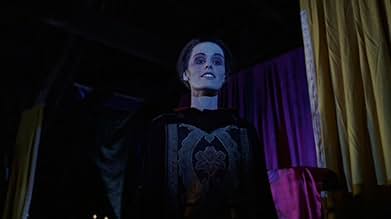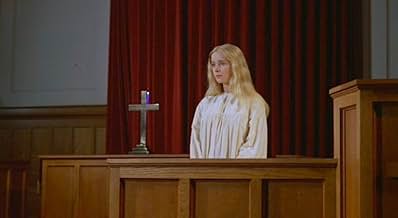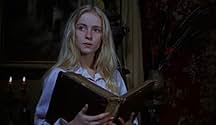Lemora la metamorfosi di Satana
Titolo originale: Lemora: A Child's Tale of the Supernatural
VALUTAZIONE IMDb
6,1/10
2682
LA TUA VALUTAZIONE
Aggiungi una trama nella tua linguaA young girl who returns to her hometown to see her dying father finds herself being drawn into a web of vampirism and witchcraft.A young girl who returns to her hometown to see her dying father finds herself being drawn into a web of vampirism and witchcraft.A young girl who returns to her hometown to see her dying father finds herself being drawn into a web of vampirism and witchcraft.
- Regia
- Sceneggiatura
- Star
Recensioni in evidenza
Scary repeated showings on Thing Theater in Chicago during the 70's did their damage to me. Vampirism, lesbianism, witchcraft all done in that plodding, atmospheric 70's way. Eerie.
Modern audiences may be a little put off by this movie at first glance - just on account of its fairly low production values - but it's definitely superior to most films of its kind, although it's such a unique oddity it's hard to compare it with anything else. Lemora plays more like a dark fairy tale than a horror movie and I actually found it to be thoughtful and moving when I watched it through to the end. Atmosphere, a great story, and a likable and sympathetic protagonist are what make this movie work.
Lemora has got a southern Gothic setting, and it takes place in the 1930's, which gives the film something of the feel of the weird fiction pulp magazines that were prevalent during that time. However, in contrast to most of those tales, the main character in Lemora is a thirteen-year old girl, which gives the movie a sexual/lost innocence subtext in addition to the 'ancient horror' themes that are typical of that tradition.
Lila Lee is an angelic-looking church singer, who we learn is also the daughter of a murdering gangster. Upon receiving a letter from her estranged father (who is now apparently very ill), she sets out on a journey to reunite with him. Every male character she encounters comes across as a leering predator, with the exception of her guardian, the Reverend, who is a good man struggling with his desires to possess the young girl.
Once she leaves for Asteroth, there is no turning back for Lila, as it becomes more and more clear that no matter what should befall her on her journey, she will never be the same singing angel that she once was. And her future looks pretty grim. Stranded in a horrific swampland, she is pursued by its gruesome inhabitants - men who have degenerated into a pack of diseased and squealing brutes - into the domain of a mysterious vampire and her group of immortal warlocks. Cheryl Smith was perfect for this as Lila - her looks and expression throughout conveying Lila's fear and confusion and innocent faith and her longing for someone she can trust; if you can't believe in her, or Leslie Glib as the dark title character, the movie fails, but they pull it off wonderfully. I found the score and songs that were used in Lemora to be strangely moving and the sound effects were often genuinely creepy.
From what I've read, this movie got into some trouble with the church upon it's release and I think it was placed on a list of banned films or something. But, I think that the theme of Lemora would have to be badly misconstrued for it to be seen as offensive in the way that its detractors would probably suggest. There is really nothing polemical or anti-Christian about it that I could see; and the movie treats its devout characters with affection and understanding as they struggle with themselves and the darkness that surrounds them. The ending, while not upbeat, is consistent and honest and makes you feel something. And leaves you thinking.
I own the great-looking DVD of Lemora, and the Synapse company did a terrific job with this movie. It was released in late 2004, with a dedication to the memory of Cheryl Smith, who passed away in 2002. I remember seeing her name (appearing as Cheryl Rainbeaux Smith) in association with a lot of drive-in type horror movies and teen sex comedies, but for years she was just a semi-familiar name to me. But within the last couple years I happened to see Caged Heat and Laserblast again, and came away thinking that there was something unique about this actress. Her presence was always natural and uncontrived, with a sad vulnerability in her eyes and a dreaminess about her that seemed to come from some place beyond this earth.
I was a young child in the 70s when these movies, like Lemora, were released. The adult content of many of the drive-in films of that era obviously kept me from seeing them when they first came out, but I enjoy going back and watching them now, and I've always found the feel and style of that pre-blockbuster period to be oddly creative and interesting. But it also may be that I feel a lot of nostalgia for those naive and carefree times in my own life, when I would have had a small boy's crush on a blonde-haired starlet like Cheryl Smith. I'm not sure I remember seeing any of Cheryl's movies when I was young, but in some way I associate her with a lot of the joy and fascination of those times. I imagine that many other people do too.
Lemora has got a southern Gothic setting, and it takes place in the 1930's, which gives the film something of the feel of the weird fiction pulp magazines that were prevalent during that time. However, in contrast to most of those tales, the main character in Lemora is a thirteen-year old girl, which gives the movie a sexual/lost innocence subtext in addition to the 'ancient horror' themes that are typical of that tradition.
Lila Lee is an angelic-looking church singer, who we learn is also the daughter of a murdering gangster. Upon receiving a letter from her estranged father (who is now apparently very ill), she sets out on a journey to reunite with him. Every male character she encounters comes across as a leering predator, with the exception of her guardian, the Reverend, who is a good man struggling with his desires to possess the young girl.
Once she leaves for Asteroth, there is no turning back for Lila, as it becomes more and more clear that no matter what should befall her on her journey, she will never be the same singing angel that she once was. And her future looks pretty grim. Stranded in a horrific swampland, she is pursued by its gruesome inhabitants - men who have degenerated into a pack of diseased and squealing brutes - into the domain of a mysterious vampire and her group of immortal warlocks. Cheryl Smith was perfect for this as Lila - her looks and expression throughout conveying Lila's fear and confusion and innocent faith and her longing for someone she can trust; if you can't believe in her, or Leslie Glib as the dark title character, the movie fails, but they pull it off wonderfully. I found the score and songs that were used in Lemora to be strangely moving and the sound effects were often genuinely creepy.
From what I've read, this movie got into some trouble with the church upon it's release and I think it was placed on a list of banned films or something. But, I think that the theme of Lemora would have to be badly misconstrued for it to be seen as offensive in the way that its detractors would probably suggest. There is really nothing polemical or anti-Christian about it that I could see; and the movie treats its devout characters with affection and understanding as they struggle with themselves and the darkness that surrounds them. The ending, while not upbeat, is consistent and honest and makes you feel something. And leaves you thinking.
I own the great-looking DVD of Lemora, and the Synapse company did a terrific job with this movie. It was released in late 2004, with a dedication to the memory of Cheryl Smith, who passed away in 2002. I remember seeing her name (appearing as Cheryl Rainbeaux Smith) in association with a lot of drive-in type horror movies and teen sex comedies, but for years she was just a semi-familiar name to me. But within the last couple years I happened to see Caged Heat and Laserblast again, and came away thinking that there was something unique about this actress. Her presence was always natural and uncontrived, with a sad vulnerability in her eyes and a dreaminess about her that seemed to come from some place beyond this earth.
I was a young child in the 70s when these movies, like Lemora, were released. The adult content of many of the drive-in films of that era obviously kept me from seeing them when they first came out, but I enjoy going back and watching them now, and I've always found the feel and style of that pre-blockbuster period to be oddly creative and interesting. But it also may be that I feel a lot of nostalgia for those naive and carefree times in my own life, when I would have had a small boy's crush on a blonde-haired starlet like Cheryl Smith. I'm not sure I remember seeing any of Cheryl's movies when I was young, but in some way I associate her with a lot of the joy and fascination of those times. I imagine that many other people do too.
The late and sorely missed Cheryl Smith stars as Lila, the lovely pubescent daughter of a notorious gangster, who is being fostered by a kind-hearted minister. Unaware of her father's whereabouts and concerned for his well-being, she receives a letter indicating that he lays ailing in a mapped location, and should she choose to visit him, then she must do so alone. Thus begins Lila's dark odyssey...from the minute she steps away from the familiar safety of her front door, her nest of childhood innocence is given way to a bleak and frightening world fraught with drunks, strumpets, and lecherous men...but a corporeity of a far more uncanny and sinister nature awaits her at her journey's end...the mysterious letter she received was a siren-song luring her to the incommunicado home of Lemora, a vampiress with an appetence for the blood of youths. This ancient, statuesque creature resides with her cackling old charlady and a mottle of emaciated children in a dark swampland where savage ghouls prowl the night.
The bizarre nexus ensuingly forged between Lemora and Lila is simultaneously horrific and erotically charged...the small-framed, willowy Lila futilely resisting, though apprehensively drawn to, the imposing and mysterious Lemora. It's an arousing 'butch/femme' dynamic which works well, and is illustrated more intricately than most examples of the gratis lesbiana inclusive to vampire cinema.
An artfully executed celestial nightmare with subtexts touching on religious hypocrisy and elegiac loss of innocence, LEMORA demonstrates perfectly how integrity, creativity, and resourcefulness can compensate heartily for dearth of funds in a motion picture production.
Superior. 9/10.
The bizarre nexus ensuingly forged between Lemora and Lila is simultaneously horrific and erotically charged...the small-framed, willowy Lila futilely resisting, though apprehensively drawn to, the imposing and mysterious Lemora. It's an arousing 'butch/femme' dynamic which works well, and is illustrated more intricately than most examples of the gratis lesbiana inclusive to vampire cinema.
An artfully executed celestial nightmare with subtexts touching on religious hypocrisy and elegiac loss of innocence, LEMORA demonstrates perfectly how integrity, creativity, and resourcefulness can compensate heartily for dearth of funds in a motion picture production.
Superior. 9/10.
Never had heard of this one before, and I assumed it would just be a low-budget snoozer - but it's not! It's pretty damn good! Angelic girl leaves her church to find her murderous dad so she can forgive him and finds herself involved with vampires instead. Very well shot and quite creepy. This deserves more attention. Plenty of tension; it feels like there's something supernatural and terrifying around every corner. Cheryl Smith made her debut here - she would later adopt the professional nickname Rainbeaux and briefly play with the Runaways band.
6sol-
A dark, atmospheric little film, it is quite bizarre and intriguing to watch, with shadow enhancing lighting, flashy colours, great sets, and a fine lead performance by Cheryl Smith, who is a perfect choice to play an innocent uncorrupted. On the other hand, the writer-director gives off a somewhat restrained performance as a priest, and towards the end, the film heads off into rather messy territory, with excesses of horror and too many slow motion, plus it takes forever to wrap the story up. There are some interesting ideas at hand, and a few worthwhile production elements, but overall this is a film that is much more so interesting than it is great.
Lo sapevi?
- QuizNotably similar to the story Carmilla by Sheridan Le Fanu in which a female seduces a teenage girl. Towards the end of the film Lemora indicates that she has had many names.
- BlooperWhen Lila is first taken into the house by Lemora, she is told to go upstairs to her room. Lemora says "It is the first open door at the end of the hall." But when Lila goes upstairs ALL of the doors are closed.
- ConnessioniFeatured in Movie Macabre: Lemora A Child's Tale of the Supernatural (1983)
- Colonne sonorePaper Angel
Sung by The Black Whole
I più visti
Accedi per valutare e creare un elenco di titoli salvati per ottenere consigli personalizzati
- How long is Lemora: A Child's Tale of the Supernatural?Powered by Alexa
Dettagli
- Data di uscita
- Paese di origine
- Lingua
- Celebre anche come
- Lemora: A Child's Tale of the Supernatural
- Luoghi delle riprese
- Phillips Mansion - 2640 W. Pomona Boulevard, Pomona, California, Stati Uniti(Lemora's house exteriors)
- Azienda produttrice
- Vedi altri crediti dell’azienda su IMDbPro
Contribuisci a questa pagina
Suggerisci una modifica o aggiungi i contenuti mancanti

Divario superiore
By what name was Lemora la metamorfosi di Satana (1973) officially released in India in English?
Rispondi

